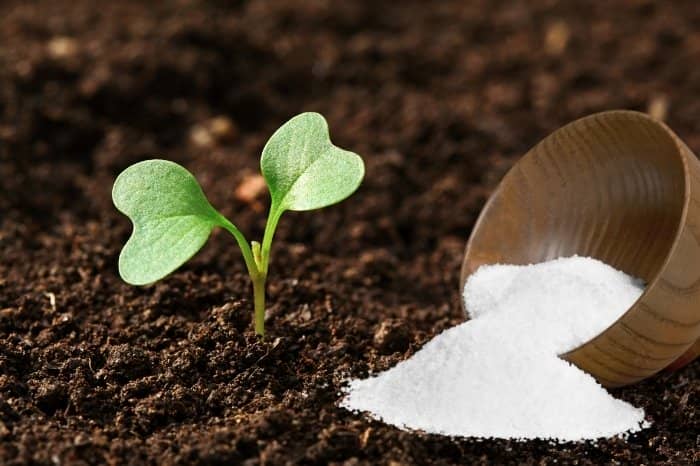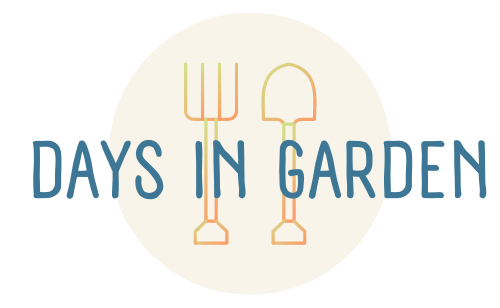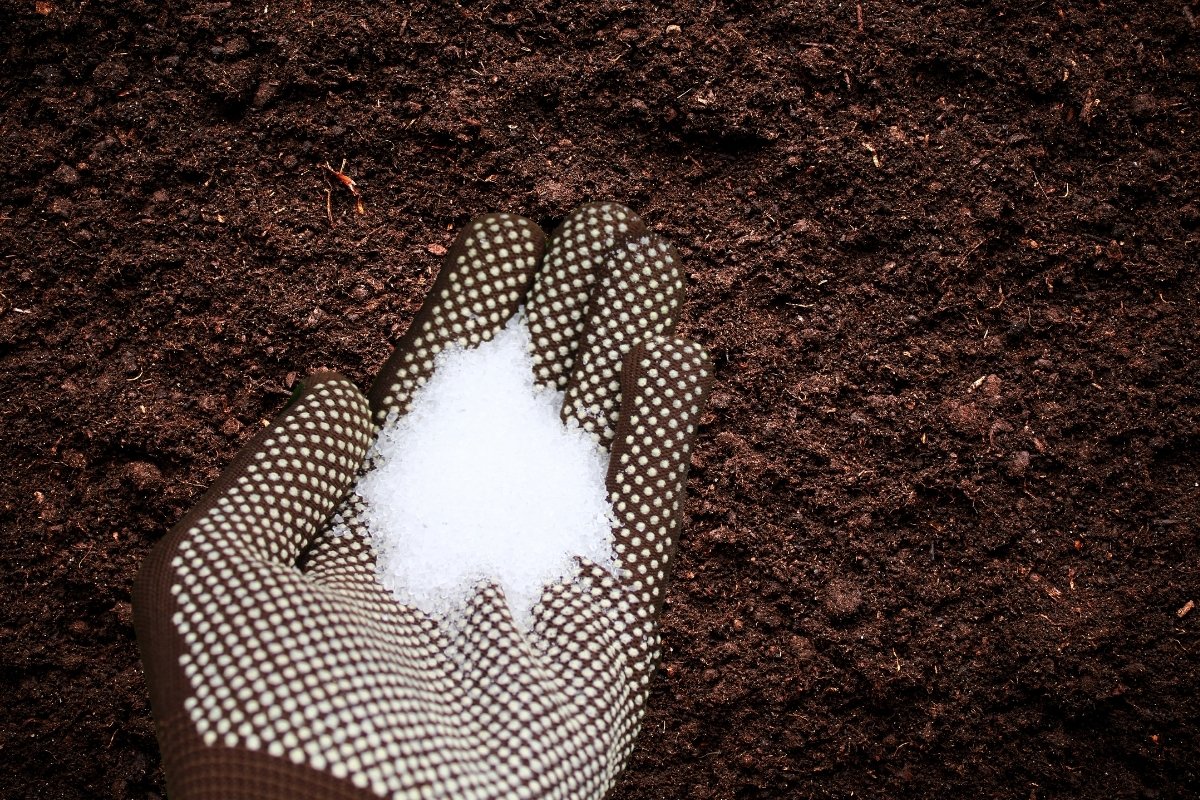Many readers have asked us, “Does Epsom Salt Make The Soil Acidic?”. Before adding any amendment, you should ensure that you first analyze your garden soil. To do this, you will need a soil testing kit that comes with simple instructions. In order to identify any potential problems, be sure to thoroughly examine the soil.
You would be glad to know that Epsom salt has many benefits as it can exacerbate root rot caused by calcium insufficiency. However, if you do make use of it, take care to never apply the salt directly onto the foliage because it can harm your plants.
So, let’s address the concern of whether applying these salts to your growing medium will make it acidic or not. Soil pH is important when growing plants as while some may like acidic soils, others prefer neutral or alkaline soils. Have a look below to find out what would work best for your garden.
Does Epsom Salt Make The Soil Acidic? – Can Too Much Epsom Salt Hurt Plants?
We are aware that because Epsom salt possesses magnesium sulfate, many people use it in their gardens. However, this salt can indeed burn your plants, if you apply too much of it in an incorrect manner. Although it is an excellent amendment for removing pests from your garden and encouraging your plants to yield abundant harvests, caution should be taken when using it.
As Epsom salt aids in photosynthesis, it can also give your plants a brighter appearance. But, your plants might not need it if they appear healthy and are producing normally. When employing this ingredient in your garden, this is where the issue emerges as you could unbalance your soil if you use too much.
Does Epsom salt make the soil acidic? The answer is; not really, as salt does not alter the pH levels of the soil drastically. However, it can be used in excess to lower the soil pH. Keep in mind that it can cause an imbalance depending on the results of the initial soil test before application.
This imbalance can prove problematic if the soil is not tested before use as it can flaw your plants. So, ensuring that you test the soil before adding Epsom salt will be beneficial and save you a lot of trouble. If you discover that your soil has adequate nutrient levels, then amending it is not necessary.
Which Plants Like Epsom Salts?
Epsom salt is a great addition to the soil if your plants lack nutrients. So, does Epsom salt make the soil acidic? Seeing that we have given you the answer, you would need to keep in mind that not all plants require the high magnesium levels that come from them. But, to acquire a significant harvest or flourishing garden, it is vital to invest in additional farming inputs like Epsom salts.
Grasses and succulent plants like Epsom salt because it contains sulfur chemical and magnesium makeup. These plants thrive in nutrient-rich soil that is amended with this salt. Have a look at the list of plants below that produce abundant yields in this type of soil.
Plants That Like Epsom Salts – Does Epsom Salt Make The Soil Acidic
1. Rose Plants – The addition of these salts speeds up the flowering process, resulting in abundant bright blooms.
2. Lettuce: It encourages the development of bigger leaves, which leads to a better yield.
3. Peppers: Amending the soil with this salt promotes the blossoming stage in these plants.
4. Cucumbers: Epsom salt helps promote greater leafiness and rapid growth and development.
5. Legumes – These salts aid in the formation of chlorophyll, which improves production.
6. Tomatoes – It encourages the growth of the leaves and the establishment of the roots, ensuring a fruitful yield.
7. Succulents – By encouraging root growth, they remain healthy when grown in soil that is rich with magnesium.
8. Grass – Epsom salt encourages the growth of luscious grass that enhances any landscape.
Epsoak Epsom Salt – 18 lb. Resealable Bulk Bag Agricultural Grade
Can I Sprinkle Epsom Salt Around Plants?
Yes, you can sprinkle Epsom salt around plants; however, ensure that you do not allow the salt to touch the leaves or foliage as it can cause them to burn. If your soil is found to be sulfur or magnesium-deficient after testing, you can amend it. This can be done by mixing a cup of the salts in every 100 square feet of soil.
Alternatively, you could treat the soil with a solution of one tablespoon of Epsom salts to a gallon of water. The same ratio can be used to generate a spray that you can use to feed your plants every two weeks. This application is excellent for rosebush yields. At the beginning of the blooming season, it is best to scatter half a cup into the ground at the bush’s base.
Every two to four weeks or so, distribute a tablespoon around the root zones of your azaleas and rhododendrons. Before transplanting the seedlings for tomato and pepper plants, add a tablespoon of salt to the planting holes. Once they begin to thrive, you can apply the spray once every week.
Take Out Time to Also Read:
Is Epsom Salt Good For All Plants?
Seeing that Epsom salt contains sulfur, it has the ability to increase a plant’s resistance to disease. Magnesium is another of its components that strengthens plant cellular structures, facilitating easier absorption of other nutrients like phosphorus. While most soils generally have ample sulfur, some can be magnesium deficient. Have a look at the pointers below to come to your own conclusion.
Key Points – Does Epsom Salt Make The Soil Acidic
- Soil can become magnesium deficient when the ground is sandy or acidic.
- When a plant is nutritionally deficient, it will display specific symptoms that can be easily identified.
- Magnesium deficiency can result in reddish-brown coloration between the veins of the leaves, which can cause the leaves to drop off early.
- Tomato, raspberry, grape, rhododendron, apple, and rose plants are visually flawed if the soil does not contain sufficient nutrients.
- The telltale signs of insufficient sulfur result in leaf veins that become yellow.
- When a plant lacks potassium, it produces weak fruit and flowers and has purple or yellowish leaves with burnt borders.
- Plants and trees develop more slowly than they should and have dull, yellow foliage if the soil is deficient in phosphorus.
- A lack of nitrogen in the soil can result in pink-tinted foliage.

Conclusion, Does Epsom Salt Make The Soil Acidic?
Epsom salts are said to have various advantages which include a greater intake of nutrients, greener vegetation, additional micronutrients, pest prevention, pH neutralization of the soil, and magnesium. These are nutrients that are necessary for plant growth and abundant yields.
The ability of a plant to absorb other nutrients, such as nitrogen and phosphorus, is enhanced by magnesium which is provided by Epsom salt. Additionally, it promotes root development and winter hardiness. Nitrogen and magnesium are essential for the synthesis of chlorophyll, which gives plant leaves their distinctive green color.
Your crops will get greener and healthier after you apply Epsom salts due to the elevated rates of photosynthesis. Keep in mind that plants like roses, cucumbers, peppers, and tomatoes need magnesium to flourish. These micronutrients act as enzyme activators which are essential.


